
By Cordelia Woodward, Registered Dietitian, MyNutriWeb
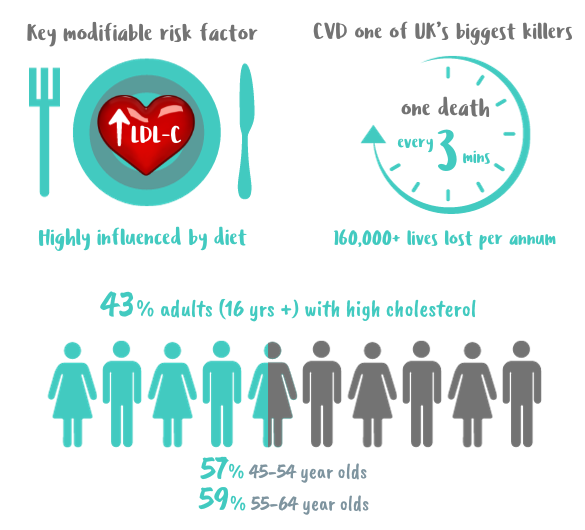
The UCLP©
The HEART UK Ultimate Cholesterol Lowering Plan© (UCLP©) is a 3-step science-based dietary approach to lower cholesterol and for overall heart health. Behaviour change strategies and the step-by-step approach enables for flexibility and tailoring to meet individual preferences. The plan provides lots of practical tips, healthy hacks and delicious UCLP© recipes with plant and fungi proteins.
This year’s HEART UK National Cholesterol Month focuses on budget-friendly ideas to prove that heart healthy eating doesn’t have to break the bank. Here are our top 10 tips that showcase how the UCLP© can provide a smarter way to keep cholesterol levels in check and in budget…
UCLP©’s 10 top tips to inspire…

- Behaviour change strategies play a crucial role in dietary success, as highlighted in the NICE guidelines2. UCLP© Step 1 provides healthcare professionals with tools and guidance to assist individuals in gaining and sustaining motivation.
- Take one step at a time. Attempting too many changes at once can be daunting and may hinder individuals from establishing and maintaining their motivation. It’s essential to progress at a pace that aligns with each individual’s needs.
“The UCLP© Checklist helps individuals get in the right mind-set: Start by identifying and celebrating the aspects of your diet already supporting heart health, before looking at areas that can be improved.” — Elphee Medici, Nutrition Communications Consultant and UCLP© Campaign Lead, Nutrilicious
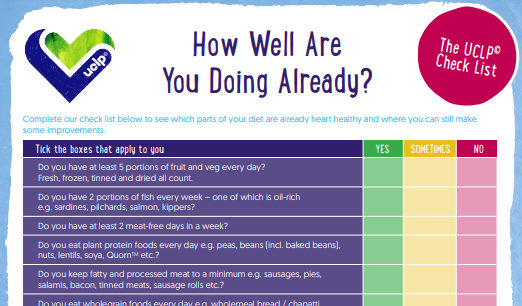

UCLP© offers lots of budget-friendly heart healthy tips and ideas of how eating for a healthier heart is delicious, and affordable.
- Cutting down meat and replacing with plant and fungi proteins is not only great for managing cholesterol3-5 but it’s also affordable and depending on your choice, can even be cheaper!
- Fungi proteins such as Quorn mycoprotein which is naturally low in saturated fat and rich in fibre, can easily replace meat in recipes – and other cheaper options include tinned beans and lentils as well as soya mince.
- Try out our special National Cholesterol Month UCLP© Quorn mycoprotein inspired recipe that costs just £1.29 per serving – Quorn Mexican skewers with spicy rice and lime yogurt – delicious!
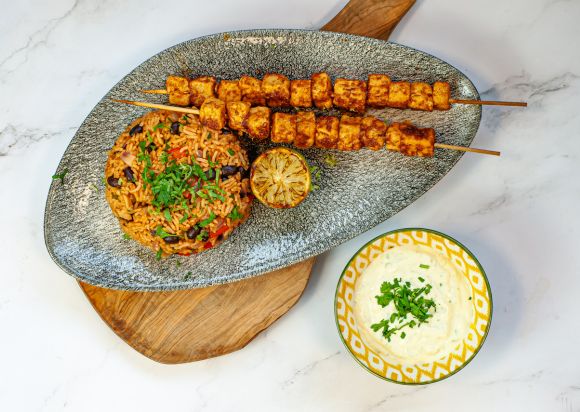
- Other cheaper options include using tinned fruit or frozen vegetables in place of fresh, especially when out of season.
- Meal planning can significantly reduce food waste (and grocery bills) by allowing individuals to buy only the ingredients they need for planned meals, preventing items from going unused and spoiling.
- Look across the range of brands available to identify the most budget-friendly options and make use of supermarket reward schemes where certain brands can be discounted
“Frozen berries are a much cheaper way to buy berries and are the best way to enjoy berries at any time of the year. They can be used in many recipes such as this aromatic autumn fruit compote – delicious and also happens to provide almost a quarter of the daily recommended intake of fibre” – Lynne Garton, Consultant Dietitian for HEART UK

Help individuals overcome the preconception that having less meat and more plant and fungi proteins requires more effort and that new skills are needed.
Effortless UCLP© hacks to get more plant and fungi proteins into the diet:
- Using plant and fungi ‘meat alternative’ proteins such as soya and Quorn Pieces, Fillets or Mince to partly or fully replace meat is super easy and effortless and requires no new skills. An easy way to transform curries, stews, fajitas, spaghetti Bolognese and chilli.
- Tinned beans and pulses are another easy and quick solution…simply add the drained and rinsed beans to recipes near the end of cooking.
- Add beans, pulses and any left-over vegetables to soups, stews, salads, curries, stir fries and pasta dishes.
- Switch to plant-based drinks and alternatives to yogurts – use in cooking, on your cereals and in drinks as you would milk. Soya drinks and soya alternatives to yogurt in particular, should be used as soya protein has been proven to reduce cholesterol beyond its role in displacing saturated fat in the diet3,5.
- Explore the UCLP© recipes, and see how effortless it is to transform classic favourites with more plant and fungi proteins.
- Join the UCLP© growing community (nearly 15,000) to receive regular heart healthy and cholesterol lowering tips and recipes to inspire!
“Our Quorn Mince and Fillets make great simple swaps for anyone trying to eat slightly healthier or reducing their meat intake without compromising. They are great for batch cooking and meal prepping, as you can batch make sauces in advance, and then simply add the Quorn when reheating as they cook super simply & quickly from frozen in sauces. I love the versatility of them, and how well they take on flavours that you can pair with them, my personal favourite at the moment would be using our Mince to make a super fragrant filling for gyozas, or in a Thai style lamb salad where it works really well with the fresh flavours!” – Tom Bell, Innovation Chef, Quorn Foods

- Use the UCLP© recipes as inspiration proving that heart healthy recipes are mouth-watering, attractive and varied to suit any palette.
- Many of the recipes are classic familiar favourites with a UCLP© twist incorporating more plant and fungi proteins and which can be shared with friends and family to turn healthy eating into a social and enjoyable experience.
“We eat with our eyes as well as our mouths. Including a mix of colourful foods – particularly fruit, vegetables, nuts, seeds and legumes – not only makes a dish look appetising but can help increase a variety of nutrients in the diet. Food presentation is so important when it comes to the enjoyment of eating and you don’t have to be an expert chef to make dishes look good. Something as simple as placing food on a nice plate, setting the table or garnishing with fresh herbs can really make a difference!” – Sarah Barnes, Nutrition Manager, Danone UK & Ireland
![]()
- Improving eating habits is a great step, but keeping up the good work for the long-term can be the biggest challenge. The UCLP© has various tools, encompassing behaviour change interventions, to help keep individuals on track.
- Each step offers flexibility and adaptability empowering individuals to take control of the choices they make.
- Reviewing and revising progress at regular intervals allows the plan to be adapted and evolve as per the individual’s needs and preferences.
- Join the UCLP© growing community and receive regular tips, motivational cues and inspiring recipes.
“One step at a time: Focus on one or max. two improvements to master at a time, and take it at your own pace. Move on to the next change when you are ready.” – Elphee Medici

The UCLP© provides a selection of options to help keep saturated fat intakes low including some great hacks.
- Including more plant and fungi proteins such as soya, Quorn mycoprotein, beans or lentils to partly or fully replace meat is a great way to keep saturated fats down.
- Make use of plant-based alternatives to dairy – naturally low in saturated fat (with the exception of coconut-based varieties).
- Proteins & the UCLP© guide: discover our guide to protein balance and diverse choices, that can be effortlessly incorporated in your meal preparations. From beans and lentils to meat alternatives like fungi-derived Quorn mycoprotein and soya. Full of tips, hacks and recipe inspirations.
“Always offer a like for like switch e.g., stewed fruit with a nut and oat topping vs a standard crumble.” –- Elphee Medici
“Using nutritional information or front-of-pack traffic light labelling on food labels can be a really helpful tool when trying to make healthier choices. They allow you to make informed decisions and also to compare products at a quick glance. Opting for options that are low (green/≤ 1.5g per 100g) or medium (amber/> 1.5g to ≤ 5.0g per 100g) in saturated fats will help keep intakes down.” —Dr Louise Durrant RD, Nutrition Communications Manager, Quorn Foods
![]()
Replacing saturated fats with healthier unsaturated fats (consumed in moderation) has been proven to be an effective dietary adaption for cholesterol lowering.
- Unsaturated fats are mainly found in plant foods and oil-rich fish. Plant-based fats include vegetable oils and spreads, nuts, seeds and avocados.
- Rapeseed oil/standard vegetable oil is a good store cupboard ingredient that’s great to cook with, high in plant omega 3 fatty acids and is also the most affordable.
- Watch out for palm, coconut and shea fats and oils – the exceptions. These are best kept to a minimum due to their high quantities of saturated fats.
- UCLP© Step 2: Heart Healthy Fats – handy swaps and tips including advice on take-aways, eating out and ready meals too, ensuring we are keeping the advice practical and attainable.
![]()
- Flexibility and tailoring are key to success – the UCLP© ensures that various dietary preferences and needs are catered for.
- The individual can select one single change they want to make at a time, with each adaptation offering a plethora of heart healthy options.
- Now available are useful variations of the UCLP© including the vegan UCLP© and the menopause UCLP©, each featuring downloadable factsheets and a selection of recipes.
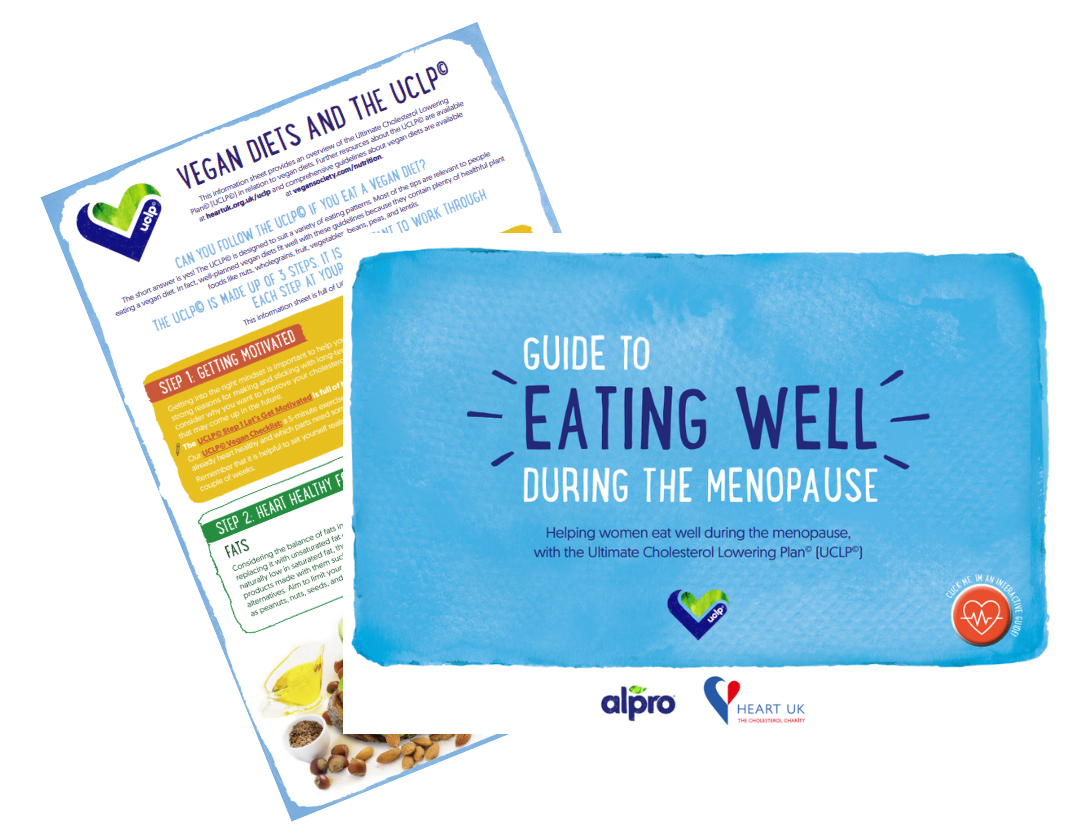
“The UCLP© has been designed to suit a range of eating patterns, allowing individuals the freedom to select the foods they prefer. The personalised approach has played a pivotal role in its success, empowering individuals to take control of their choices.” –- Lynne Garton
![]()
- Heart healthy diets are predominantly based on healthful plant and fungi-based ingredients which have been shown to have a low environmental impact7 . Thus, demonstrating that heart healthy dietary advice, like the UCLP©, are synonymous with sustainable dietary advice.
- Sustainably sourced fish is encouraged within the UCLP©, with practical advice around looking on the labels of fish for Marine Stewardship Council (MSC) or the Aquaculture Stewardship Council (ASC) logo.
“I am a fan of UCLP©. Not only is it evidence based and highly accessible in its application it also champions the latest principles of sustainable eating and is therefore a win win for health and planet” –– Tanya Haffner, Registered Dietitian, Chair of the BDA Sustainable Diets Specialist Group, CEO MyNutriWeb
“Both Public Health England and the British Dietetic Association have recommended a diet with more plant-based and fungi proteins, like mycoprotein, and cutting down on red meat and processed meat through the Eatwell Guide and One Blue Dot.6 It’s proven that following the Eatwell Guide diet will generate a much lower environmental impact than the current UK diet. Also, a paper published last year also confirmed that if we replace just one-fifth of global beef consumption with mycoprotein, we can halve annual deforestation and carbon emissions by 20507. That’s to say, a diet with Quorn mycoprotein can be good for your health (mycoprotein is high in protein and fibre, low in saturated fat, containing no cholesterol, good for gut health and can help build muscle as effectively as animal protein) and the health of mother Earth too.” — Khanh Mach, Sustainability Specialist, Quorn Foods

Oats, barley, nuts including peanuts, products fortified with plant stanols and sterols, soya foods and drinks make up the final UCLP© Step 3. Each of these foods have been proven to further reduce serum cholesterol when added to an already heart healthy foundation diet. For each food the UCLP© offers a variety of options to choose from and covering all price ranges.
- Oats & barley: cheap and rich in the cholesterol lowering fibre – beta-glucan. Simple food options include porridge, overnight oats, oat cakes and pearl barley in soups, risotto or as an alternative grain to rice.
- Foods fortified with plant stanols or sterols: most products can be easily incorporated into a healthy diet and many products provide the effective dose (1.5-3g) in just one serving but do check the labels for exact amounts.
- Nuts & peanuts: great versatile options providing fibre, minerals and heart healthy unsaturated fats. Just one handful (about 28-30g) daily is needed to lower cholesterol. Peanuts make a great cost-effective option.
“I love adding nuts to all sorts of dishes – savoury and sweet! Not only do they bring a delicious nutty flavour but they can add texture too. Plus if you keep nuts sealed they last longer and you can have them on standby to jazz up a dish!” —Sarah Barnes
- Soya foods and drinks: Start with one serving daily and gradually build up to three daily servings. Include tofu, soya mince, edamame beans, soya drinks and alternatives to yogurts. Take a look at what counts as a serving.
You may also be interested in:
Proteins: Getting the right balance for muscle & heart health


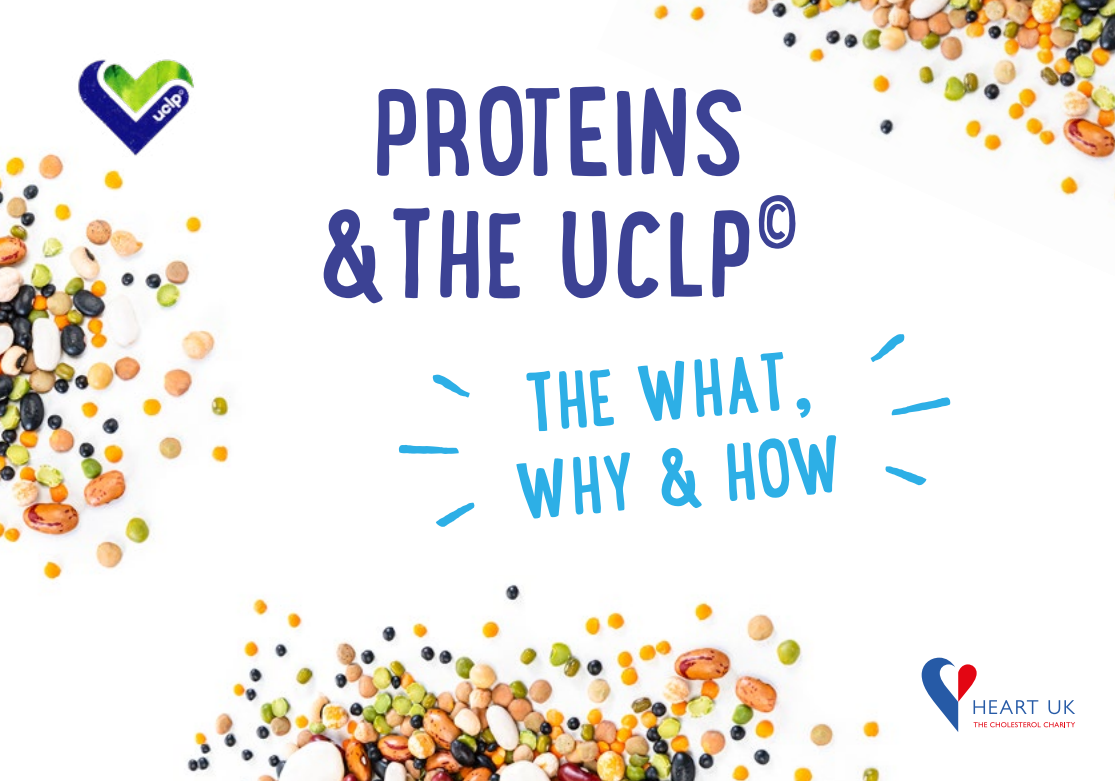





In terms of behavior change strategies mentioned in the UCLP©, could you provide more insight into specific techniques recommended for healthcare professionals to assist individuals in gaining and sustaining motivation? Tel U
Hello and thank you for your comment. Step 1 of the UCLP goes into detail about motivation starting with a ‘Let’s Get Motivation’ Questionnaire, available here: https://www.heartuk.org.uk/downloads/factsheets/uclp/uclp-step-1-lets-get-motivated.pdf
Making small realistic changes can help with gaining and sustaining motivation. Regularly reviewing how the individual is getting on with the plan is also important.
The plan is flexible and allows the individual to pick and choose cholesterol lowering foods and together with the health professional, a realistic plan can be made, taking into account likes and dislikes.
I would recommend to join the UCLP community for more detailed tips: https://www.heartuk.org.uk/ultimate-cholesterol-lowering-plan/e-news
Many thanks